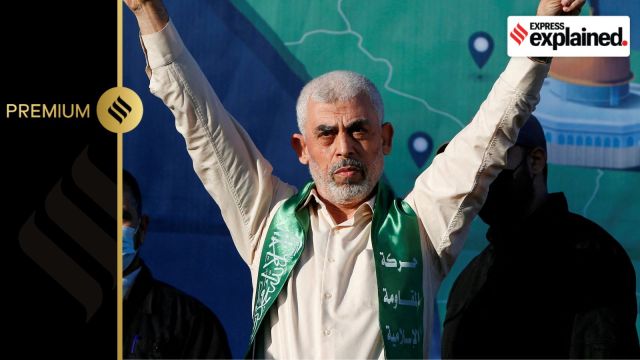What the killing of Yahya Sinwar means for Hamas and the war in Gaza
Sinwar had been de facto chief of Hamas since 2017, and its man on the ground in Gaza. He was also in-charge of Hamas’s military operations, and the alleged mastermind of the October 7, 2023 terrorist attacks on Israel.
 Yahya Sinwar was Hamas's top man on the ground in Gaza. (Reuters)
Yahya Sinwar was Hamas's top man on the ground in Gaza. (Reuters)The killing of Yahya Sinwar by Israel on Thursday might well be the most significant development in the year-long war in Gaza.
Sinwar had been de facto chief of Hamas since 2017, and its man on the ground in Gaza. He was also in-charge of Hamas’s military operations, and the alleged mastermind of the October 7, 2023 terrorist attacks on Israel.
Eliminating Sinwar had been a top priority for Israel. How will his killing impact the war in Gaza?
First, why was Sinwar important for Hamas?
At the time of his death, Sinwar was the most powerful figure in Hamas. After Israel eliminated other power centres such as Ismail Haniyeh, the chief of Hamas’s political bureau, and military commander Mohammed Deif, “Sinwar became the sole decision maker, and grew stronger and stronger as Israel killed more and more important figures,” Harel Chorev, senior researcher at the Moshe Dayan Center at Tel Aviv University, told CNN.
Despite being at the top of Israel’s list of targets, Sinwar had stayed in Gaza, personally coordinating military operations, and he was ultimately killed in combat overground, not in the tunnels where the Hamas leadership has typically hidden.
Sinwar had been freed from Israeli prison in 2011 after more than 22 years of incarceration, as part of a large prisoner-swap deal. He had been serving four life sentences for allegedly massacring two Israeli soldiers and 12 Palestinian collaborators in the 1980s, and was the most high-profile Hamas figure to have been released.
In 2017, he became the political chief of Hamas in Gaza. He worked to restore ties with Egypt, which was crucial to Hamas’s vast smuggling network in Gaza, and improve relations with Iran, which patronised Hamas as part of its “axis of resistance” against Israel.
So, does Sinwar’s death signal the end of the road for Hamas?
Yes and no.
Given Sinwar’s stature, his death leaves a massive power vacuum in Hamas. Khaled Mashal, the man billed to replace him, has a strong public profile, but does not command the loyalty that Sinwar did on the ground. Hamas is in disarray, possibly the weakest and most demoralised it has ever been, and any attempt at rebuilding will face massive challenges.
That said, Hamas is yet to be wiped “off the face of the Earth”, as Israel’s Prime Minister Benjamin Netanyahu has promised to do. Some experts believe that the coming phase of the conflict in Gaza might in fact be more difficult for Israel.
Sinwar’s death “certainly doesn’t mean the end of Hamas. It doesn’t even mean the end of the insurrection that has been taking place in Gaza since the end of the Rafah campaign, which is, I believe, the war that Hamas actually wanted to fight,” Hussein Ibish, Senior Resident Scholar, Arab Gulf States Institute, said in an interview with PBS.
According to Ibish, a low-intensity insurrection “doesn’t require extensive command-and-control” or a “single charismatic leader”. Hamas’s formal battalion structure has been all but obliterated in Gaza, he said, and “leadership will [now] fall to either an armed person in Gaza, or perhaps even a diverse set of armed leaders”.
Does Sinwar’s death mean victory for Israel?
Killing Sinwar was among the foremost objectives of Israel’s campaign, and Thursday’s success is a very significant milestone achieved, even if Hamas manages to fight on.
“Today we made clear once again what happens to those who harm us. Today we once again showed the world the victory of good over evil,” Netanyahu said while confirming Sinwar’s death.
Sinwar’s killing could potentially pave the way for a ceasefire deal, and the return of the Israeli hostages who are still alive. He was seen as the biggest obstacle to negotiations on the Hamas side — he was Israel’s top target, and had little personal incentive to negotiate.
Bringing back the hostages is crucial for Netanyahu politically. He has faced constant protests and demonstrations in the Israeli street from supporters of the families of the hostages. “I call on everyone who holds hostages, whoever lays down their weapons and returns them, we will allow them to leave and live,” Netanyahu said on Thursday.
Most experts believe that Israel will use the window offered by Sinwar’s death to negotiate the release of hostages.
Does this mean that the conflict will likely be over soon?
On Thursday, Netanyahu declared that “the war, my dear ones, is not yet over”. Many believe that even if Hamas were to agree to a hostage deal, he would like to continue fighting only to ensure his own political survival. He may use the vague goal of “total victory” to press on, and his far right allies will support this policy.
What the US does is important. President Joe Biden on Friday said he hoped Sinwar’s death would present “an opportunity to seek a path to peace — a better future in Gaza without Hamas”. But the presidential election is now less than three weeks away, and Netanyahu may well decide to stay the course at least until then.
- 01
- 02
- 03
- 04
- 05






































